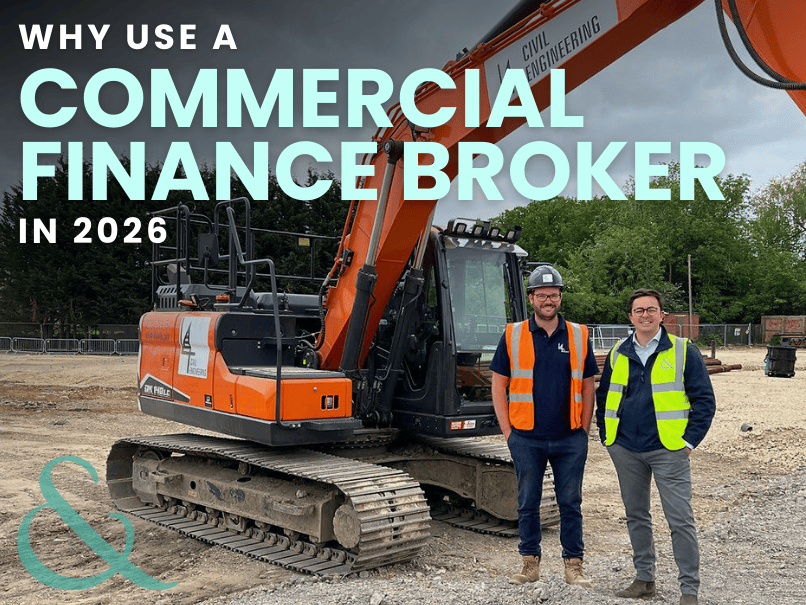Table of contents
We know builders understand construction better than anyone. You know what a project really costs, how long it takes, and where the risks lie. But when it comes to stepping into property development, the biggest hurdle often isn’t the build, it’s the finance.
If you’re ready to move from delivering other people’s projects to developing your own, this guide is designed to help. We’ll walk you through the development finance options available, explain what lenders look for, and show you how to structure your project for funding success.
Why Consider the Transition to Property Development?
Stepping from building for others into developing your own projects opens the door to a new level of opportunity. As a developer, you can:
- Leverage your expertise while gaining valuable business skills that generate higher returns on your time and knowledge.
- Control the full process from concept to completion, rather than working within someone else’s plans and budget.
- Build long-term wealth through commercial property ownership and development profits, not just by trading time for money.
- Access competitive finance terms unlike the standard working capital loans typically available to building firms.
The real challenge isn’t construction. The hurdle is understanding how development finance works, what lenders require, and how to structure your project so it attracts the right funding.
Understanding the UK Property Development Market in 2025
The landscape for property development continues to evolve, and for builders looking to take the next step, the timing is strong.
Market Fundamentals
The UK still faces a shortage of new homes, especially in urban centres and growing regional towns. This supply-demand imbalance creates opportunities for developers who can navigate planning and finance effectively.
Regional Opportunities
Beyond London, cities like Manchester and Birmingham are thriving hotspots, offering strong rental yields and accessible entry points. Manchester’s economy, for instance, is forecast to grow 2.2% between 2024–2027, ahead of the 1.9% national average.
Sustainability Requirements
By 2030, all privately rented homes must achieve at least an EPC rating of C. Developers who combine construction know-how with compliance are well placed to benefit.
Types of Development Finance
Unlike standard loans or mortgages, development finance is designed around project stages and risk.
Development Finance
-
Ideal for: Ground-up developments or major refurbishments, whether for sale or long-term investment.
-
How it works: Short-term funding (12–24 months), drawn in stages as work progresses, with milestones signed off by a monitoring surveyor.
Pros:
✅ Access significant capital for larger projects
✅ Flexible drawdown linked to build stages
✅ Potential for strong profits
Cons:
❎ Higher interest rates than traditional mortgages
❎ Requires detailed planning and costings
❎ Personal guarantees often needed (20-25% of loan)
Bridging Finance
- Ideal for: Land without planning, light refurbishments, auction purchases, or securing a site before arranging long-term finance.
- How it works: Short-term lending (usually up to 12 months) with quick approval and rolled-up interest. A clear exit strategy is essential.
Pros:
✅ Very fast completion (weeks, not months)
✅ Flexible for time-sensitive deals
✅ Secures opportunities others may miss
Cons:
❎ Expensive if held long-term
❎ Clear exit strategy required
❎ Higher arrangement fees
The Development Finance Process
Understanding typical timelines helps you plan projects and manage cash flow effectively:
|
Stage |
Development Finance |
Bridging Finance |
|
1. Initial Planning |
2-4 weeks • Define project scope and budget • Assess site potential and constraints • Develop initial financial projections |
1-3 days • Identify immediate funding need • Confirm exit strategy • Basic property valuation via estate agent |
|
2. Finance Application |
2-4 weeks • Compile detailed application pack • Professional valuations and surveys by third parties • Lender full assessment of project viability |
2-8 days • Application • Initial due diligence checks Initial terms issued • Property valuation by third party valuer |
|
3. Full Legal Due Diligence |
3-8 weeks • Post-valuation and survey review • Full terms issued • Full Legal due diligence Further technical due diligence |
7-14 days • Post-valuation review • Full terms issued • Full Legal due diligence |
|
4. Completion |
1 week • Legal completion • Initial drawdown (land purchase) • Project commencement |
1-2 days • Legal completion • Full funds released • Immediate use of funds |
|
Total Timeline |
8-17 weeks |
11-27 days |
What You Need Before Applying
Financial & Personal Documentation
-
Assets & Liabilities Statement for each director or partner
-
Last two tax returns for each director or partner
-
Detailed project budget and timeline
-
Evidence of deposit funds and funds to reach the first milestone (development funding is released in stages)
-
Company documentation - many developers use SPVs (Special Purpose Vehicles) to limit risk exposure
-
Experience note outlining past projects and professional history
-
Exit strategy - Charles & Dean can support, particularly where refinance is the chosen route
Professional Team
-
Architect: Design and planning application support
-
Quantity Surveyor: Cost estimation and monitoring
-
Planning Consultant: Planning requirement navigation
-
Development & Bridging Finance Broker: Access to suitable lenders
-
Solicitor: Legal contracts, warranties, insurance, and CDM compliance
Project Documentation
-
Development appraisal with projected GDV (Gross Development Value) and returns - Charles & Dean can help prepare this
-
Planning status (granted, pending, or strategy)
-
Schedule of works with realistic timelines
-
Risk assessment and mitigation strategy
Common Challenges and Solutions
Market Timing
Challenge: Property markets can shift during development.
Potential Solutions:
- Focus on areas with strong fundamentals
- Consider build-to-rent for steady income
- Pre-sell units where possible
- Work with local agents to gauge demand
Cash Flow Management
Challenge: Development finance is more complex than traditional lending.
Potential Solutions:
-
Use experienced quantity surveyors for accurate forecasts
-
Build realistic contingencies into budgets and timelines
-
Understand drawdown conditions in detail
-
Maintain backup funding for unforeseen costs
Complex Planning Requirements
Challenge: Planning is often time-consuming and uncertain.
Potential Solutions:
-
Engage consultants early in the process
-
Target sites with existing or likely consent
-
Understand local planning policies
-
Build constructive relationships with officers
Limited Development Track Record
Challenge: Lenders can prefer experienced developers.
Potential Solutions:
-
Highlight relevant construction experience
-
Start with smaller, lower-risk projects
-
Consider joint ventures with experienced partners
-
Work with specialist brokers like Charles & Dean to bridge the gap
Frequently Asked Questions
Q: How much deposit is needed for development finance?
A: Typically 15–35% of the project cost, depending on experience, risk, and LTV.
Q: Can I avoid personal guarantees?
A: They are standard, usually capped at a percentage of the loan. Requirements vary by lender - your broker will provide more information.
Q: How quickly can development finance be arranged?
A: 10-20 weeks on average. Bridging finance can be completed in 3-4 weeks.
Q: What interest rates should I expect?
A: Typically 8-9% upwards, reflecting risk and short-term nature. More experience = better rates.
Q: Can I use development finance for buy-to-let projects?
A: Yes, provided you have a clear refinancing strategy into a long-term mortgage.
Q: What if my project overruns?
A: Most lenders offer extensions, though often at higher costs - realistic planning is essential.
Q: What types of property finance does Charles & Dean offer?
A: Residential buy-to-let, commercial mortgages, bridging loans, refurbishment and development finance - tailored to acquisition, refinancing, or growth.
Q: What is development finance?
A: Funding designed for property development, covering land acquisition, construction, or refurbishment. Terms are flexible, tailored to your project.
Q: What are bridging loans?
A: Short-term loans for time-sensitive deals, useful between purchase and sale, or while arranging long-term finance.
Q: How much can I borrow?
A: Depends on property type, value, and your profile. Charles & Dean assess your goals to secure flexible, competitive funding.
Q: How does Loan-to-Value (LTV) affect borrowing?
A: LTV determines how much you can borrow against value. We access LTVs from 55–75%, tailored to property type and your profile.
Making Your Decision
The transition from builder to developer isn't right for everyone, but it could be ideal if you:
-
Have established construction expertise and want to capture more value
-
Understand project management and teamwork
-
Have access to (or can raise) deposit capital
-
Are comfortable with higher risks for higher returns
-
Want to build lasting wealth, not just trade time for money
Getting Started: Your Next Steps
-
Start small with a manageable project that plays to your strengths
-
Build your network of architects, consultants, and brokers such as Charles & Dean
-
Research your local market, planning policies, and sale values
-
Speak with a development finance specialist to explore your options
At Charles & Dean, we work with builders making this transition - helping them structure projects, secure funding, and succeed as developers. Whether you're exploring bridging finance for a quick opportunity or development finance for a larger project, we can guide you through the process and connect you with lenders who understand the construction industry.
Explore Your Development Finance Options
Book a consultation with one of our Commercial Property Finance Specialists and take the first step towards turning your building expertise into development success.
We’ll review your situation, explain your options, and show you what’s possible with your experience and capital.
The content and discussions presented are intended exclusively for professional, commercial, or institutional clients. The finance options discussed are unregulated and are not covered by the Financial Ombudsman Service (FOS). You should always seek professional advice before entering into any financial agreement. We are a credit broker, not a lender. Finance subject to status, terms and conditions apply, indemnities may be required.
Driven by his entrepreneurial spirit, Simon Grace ensures Charles & Dean delivers the very best. His commitment to driving the pace of life at C&D is evident across all areas of the business, and his passion for nurturing ambition is clear. Beyond building a team founded on determination, Simon has been instrumental in fostering strong partnerships and brand associations, reinforcing C&D’s position in the industry. He continues to drive the company’s tremendous growth, ensuring it remains a resilient and tenacious force in finance.
Fill out the form to request a callback
No Obligation Enquiry
Tailored Broker Support
Enquire in Minutes
Wide Panel of Lenders







.png?width=806&height=605&name=Why%20Use%20a%20Car%20Finance%20Broker%20(4).png)

.jpg?width=806&name=Builder%20to%20Developer%20Resource%20(3).jpg)


.jpg)
.jpg)